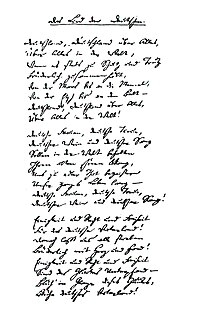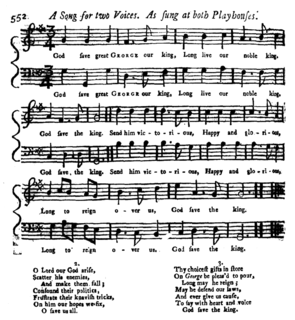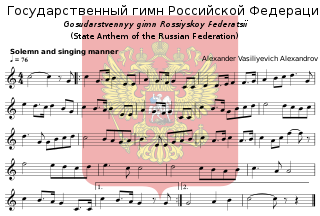Related Research Articles

The "Deutschlandlied", officially titled "Das Lied der Deutschen", or part of it, has been the national anthem of Germany since 1922. In East Germany, the national anthem was "Auferstanden aus Ruinen" between 1949 and 1990.

"God Save the Queen" is the royal anthem in a number of Commonwealth realms, their territories and the British Crown dependencies. The author of the tune is unknown, and it may originate in plainchant; but an attribution to the composer John Bull is sometimes made.

Madagascar, officially the Republic of Madagascar, and previously known as the Malagasy Republic, is an island country in the Indian Ocean, approximately 400 kilometres off the coast of East Africa. At 592,800 square kilometres (228,900 sq mi) Madagascar is the world's second-largest island country. The nation comprises the island of Madagascar and numerous smaller peripheral islands. Following the prehistoric breakup of the supercontinent Gondwana, Madagascar split from the Indian subcontinent around 88 million years ago, allowing native plants and animals to evolve in relative isolation. Consequently, Madagascar is a biodiversity hotspot; over 90% of its wildlife is found nowhere else on Earth. The island's diverse ecosystems and unique wildlife are threatened by the encroachment of the rapidly growing human population and other environmental threats.

"The Star-Spangled Banner" is the national anthem of the United States. The lyrics come from the "Defence of Fort M'Henry", a poem written on September 14, 1814, by 35-year-old lawyer and amateur poet Francis Scott Key after witnessing the bombardment of Fort McHenry by British ships of the Royal Navy in Baltimore Harbor during the Battle of Baltimore in the War of 1812. Key was inspired by the large U.S. flag, with 15 stars and 15 stripes, known as the Star-Spangled Banner, flying triumphantly above the fort during the U.S. victory.

Jana Gana Mana is the national anthem of India. It was originally composed as Bharoto Bhagyo Bidhata in Bengali by polymath Rabindranath Tagore. The first stanza of the song Bharoto Bhagyo Bidhata was adopted by the Constituent Assembly of India as the National Anthem on 24 January 1950. A formal rendition of the national anthem takes approximately 52 seconds. A shortened version consisting of the first and last lines is also staged occasionally. It was first publicly sung on 27 December 1911 at the Calcutta Session of the Indian National Congress.

Antananarivo, also known by its colonial shorthand form Tana, is the capital and largest city of Madagascar. The administrative area of the city, known as Antananarivo-Renivohitra, is the capital of Analamanga region. The city sits at 1,280 m (4,199 ft) above sea level in the center of the island, the highest national capital by elevation among the island countries. It has been the country's largest population center since at least the 18th century. The presidency, National Assembly, Senate and Supreme Court are located there, as are 21 diplomatic missions and the headquarters of many national and international businesses and NGOs. It has more universities, nightclubs, art venues, and medical services than any city on the island. Several national and local sports teams, including the championship-winning national rugby team, the Makis are based here.

"Kimigayo" is the national anthem of Japan. The lyrics of "Kimigayo" are the oldest among the world's national anthems, and with a length of 32 characters, they are also the world's shortest. The lyrics are from a waka poem written by an unnamed author in the Heian period (794–1185), and the current melody was chosen in 1880, replacing an unpopular melody composed by John William Fenton eleven years earlier. Its length of 11 measures is currently among the world's shortest. While the title "Kimigayo" is usually translated as "His Imperial Majesty's Reign", no official translation of the title or lyrics has been established in law.

The "State Anthem of the Russian Federation" is the name of the official national anthem of Russia. It uses the same melody as the "State Anthem of the Soviet Union", composed by Alexander Alexandrov, and new lyrics by Sergey Mikhalkov, who had collaborated with Gabriel El-Registan on the original anthem. From 1944, that earliest version replaced "The Internationale", as a new, more Soviet-centric, and Russia-centric Soviet anthem. The same melody, but without any lyrics, was used after 1956. A second version of the lyrics was written by Mikhalkov in 1970 and adopted in 1977, placing less emphasis on World War II and more on the victory of communism, and without mentioning the denounced Stalin by name.

The Confederation of African Football or CAF is the administrative and controlling body for African association football.

The Madagascar Plan was a proposal by the Nazi German government to forcibly relocate the Jewish population of Europe to the island of Madagascar. Franz Rademacher, head of the Jewish Department of the German Foreign Office, proposed the idea in June 1940, shortly before the Fall of France. The proposal called for the handing over of control of Madagascar, then a French colony, to Germany as part of the eventual peace terms.

The Merina people are the largest ethnic group in Madagascar. They are the "highlander" Malagasy ethnic group of the African island and one of the country's eighteen official ethnic groups. Their origins are mixed, predominantly with Indonesians arriving before the 5th century AD, then many centuries later by Arabs, Africans and other ethnic groups. They speak the Merina dialect of the official Malagasy language of Madagascar.

Ry Tanindrazanay malala ô! is the national anthem of Madagascar. The lyrics were written by Pasteur Rahajason and the music by Norbert Raharisoa. It is similar to a march and was strongly influenced by European music and the French colonial education system It is often played by Malagasy musicians on the accordion. The anthem was officially adopted on April 27, 1959 by the parliament of Madagascar prior to the official granting of independence on 26 June 1960. Philibert Tsiranana was Prime Minister of Madagascar during the creation of the anthem and Michel Debré was the French Prime Minister during this time. The main focus of the anthem is love of the land, as well as thankfulness to God and an appeal to unity and loyalty under the nation.

The Malagasy or striped civet, also known as the fanaloka or jabady, is an euplerid endemic to Madagascar.

Malagasy cuisine encompasses the many diverse culinary traditions of the Indian Ocean island of Madagascar. Foods eaten in Madagascar reflect the influence of Southeast Asian, African, Indian, Chinese and European migrants that have settled on the island since it was first populated by seafarers from Borneo between 100 CE and 500 CE. Rice, the cornerstone of the Malagasy diet, was cultivated alongside tubers and other Southeast Asian staples by these earliest settlers. Their diet was supplemented by foraging and hunting wild game, which contributed to the extinction of the island's bird and mammal megafauna. These food sources were later complemented by beef in the form of zebu introduced into Madagascar by East African migrants arriving around 1,000 CE.

The Merina Kingdom or Kingdom of Madagascar, officially the Kingdom of Imerina, was a pre-colonial state off the coast of Southeast Africa that, by the 19th century, dominated most of what is now Madagascar. It spread outward from Imerina, the Central Highlands region primarily inhabited by the Merina ethnic group with a spiritual capital at Ambohimanga and a political capital 24 kilometres (15 mi) west at Antananarivo, currently the seat of government for the modern state of Madagascar. The Merina kings and queens who ruled over greater Madagascar in the 19th century were the descendants of a long line of hereditary Merina royalty originating with Andriamanelo, who is traditionally credited with founding Imerina in 1540.

Malagasy is an Austronesian language and the national language of Madagascar. Most people in Madagascar speak it as a first language, as do some people of Malagasy descent elsewhere.

The Central Highlands, Central High Plateau, or Hauts-Plateaux are a mountainous biogeographical region in central Madagascar. They include the contiguous part of the island's interior above 800 m (2,600 ft) altitude. The Central Highlands are separated from the Northern Highlands of the northern tip of Madagascar by a low-lying valley, the Mandritsara Window, which has apparently acted as a barrier to dispersal for species in the highlands, leading to species pairs such as Voalavo gymnocaudus and Voalavo antsahabensis in the Northern and Central Highlands. Species restricted to the Central Highlands include the bats Miniopterus manavi and Miniopterus sororculus; the rodents Brachyuromys betsileoensis and Voalavo antsahabensis; the tenrecs Hemicentetes nigriceps and Oryzorictes tetradactylus; and the lemur Cheirogaleus sibreei. Because of the continuous habitat of the Central Highlands, there is little local endemism, unlike the Northern Highlands.

Abhay Kumar [Pen Name Abhay K.] is an Indian poet-diplomat and India's 21st Ambassador to Madagascar and Ambassador to Comoros. He has served in different diplomatic capacities earlier in Russia, Nepal and Brazil. His published collections of poetry include The Seduction of Delhi, The Eight-Eyed Lord of Kathmandu, The Prophecy of Brasilia,The Alphabets of Latin America among others, while his edited books are CAPITALS, 100 Great Indian Poems, 100 More Great Indian Poems, New Brazilian Poems, The Bloomsbury Anthology of Great Indian Poems,The Bloomsbury Book of Great Indian Love Poems among others. He has translated Meghaduta and Ritusamhara of Kalidasa into English from Sanskrit. He recorded his poems at the Library of Congress. His writings cover poetry, art, memoir, global democracy and digital diplomacy. His Earth Anthem has been translated into over 50 languages and was played at the United Nations to celebrate the 50th anniversary of the Earth Day. He also wrote an anthem for SAARC spurring search for an official SAARC Anthem. He wrote a 'Moon Anthem' to celebrate the success of India's Moon Mission Chandrayaan-2. He has penned a 'Mars Anthem' to inspire the younger generation to explore our neighbouring red planet. He has penned anthems on all the planets in the Solar System.

Martial Henri Merlin was a French colonial administrator of the 19th and 20th centuries. He served as the governor-general of Guadeloupe (1901–1903), French West Africa (1907–1908), French Equatorial Africa (1908–1917), French Madagascar (1917–1918), and French Indochina (1923–1925).
References
- ↑ Macmillan, Palgrave (2016-08-22). The Statesman's Yearbook 2017: The Politics, Cultures and Economies of the World. Springer. p. 784. ISBN 9781349683987.
- ↑ Harison, Marie Aimé Joël (2005). Musikgeschichte Madagaskars: unter besonderer Berücksichtigung der europäischen Einflüsse (in German). Kovač. p. 191. ISBN 9783830017752.